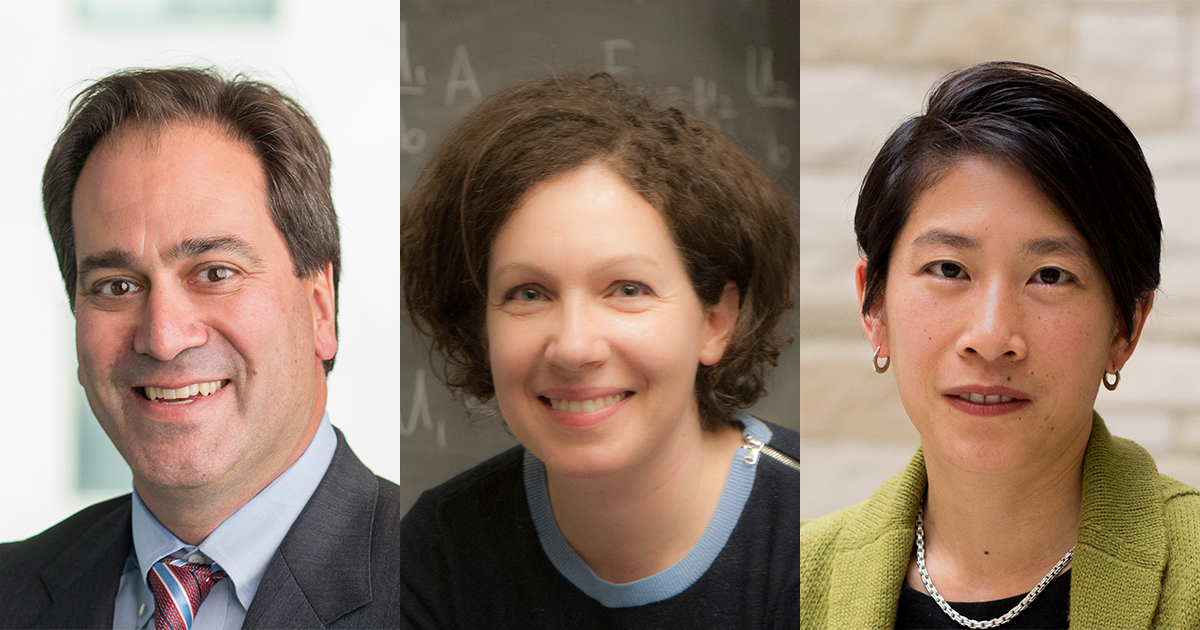Three McCormick Faculty Named 2024 Guggenheim Fellows
They are part of a diverse group of culture-creators this year working across 52 disciplines
Three Northwestern Engineering faculty are among the 2024 Guggenheim Fellows recently named by the John Simon Guggenheim Memorial Foundation. The faculty members are Chad Mirkin, Petia Vlahovska, and Teri Odom.
This year, the foundation awarded 188 Guggenheim Fellowships to a diverse group of culture-creators working across 52 disciplines. Chosen through a rigorous application and peer review process from a pool of almost 3,000 applicants, the Class of 2024 Guggenheim Fellows was tapped on the basis of prior career achievement and exceptional promise. As established in 1925 by founder US Senator Simon Guggenheim, each fellow receives a monetary stipend to pursue independent work at the highest level under “the freest possible conditions.”

Since its establishment, the foundation has awarded more than $400 million in fellowships to more than 19,000 fellows.
“Humanity faces some profound existential challenges,” said Edward Hirsch, award-winning poet and president of the John Simon Guggenheim Memorial Foundation. “The Guggenheim Fellowship is a life-changing recognition. It’s a celebrated investment into the lives and careers of distinguished artists, scholars, scientists, writers and other cultural visionaries who are meeting these challenges head-on and generating new possibilities and pathways across the broader culture as they do so.”
Along with Mirkin, Vlahovska, and Odom, Northwestern University faculty members honored were Weinberg College of Arts and Sciences associate professor of art, theory, and practice Mike Cloud; Nina Kraus, professor of neurobiology and otolaryngology and holder of the Hugh Knowles Chair of communication sciences and disorders in the School of Communication; and Krista Thompson, Mary Jane Crowe Professor in Art History and director of graduate studies in art history in Weinberg.
Chad Mirkin
Chad A. Mirkin is the director of the International Institute for Nanotechnology and the George B. Rathmann Professor of Chemistry, Chemical and Biological Engineering, Biomedical Engineering, Materials Science and Engineering, and Medicine at Northwestern.
He is a chemist and a world-renowned nanoscience expert, who is known for his discovery and development of spherical nucleic acids (SNAs) and SNA-based biodetection and therapeutic schemes, dip-pen nanolithography (and related cantilever-free nanopatterning and materials discovery methodologies), on-wire lithography and co-axial lithography and high-area rapid printing and contributions to supramolecular chemistry and nanoparticle synthesis.
He has authored over 870 manuscripts and over 1,200 patent applications worldwide (over 430 issued) and founded multiple companies. Mirkin has been recognized with over 250 national and international awards and served for eight years on the President’s Council of Advisors on Science and Technology and is one of a few scientists to be elected to all three US National Academies and the American Academy of Arts and Sciences.
Mirkin will use the award to pursue groundbreaking research that will use nanotechnology to transform how vaccines are developed for treating deadly forms of cancer.
Petia Vlahovska
Petia Vlahovska is a professor of engineering sciences and applied mathematics in the McCormick School of Engineering, where she directs the Complex Fluids and Soft Interfaces Lab.
An expert in fluid dynamics and soft matter, Vlahovska integrates theory and experiments in mathematical modeling of physical and biological systems leading to cutting-edge work on blood flow, biomembrane mechanics, electrohydrodynamics and active matter. In her studies of active fluids, Vlahovska was the first to examine the collective dynamics of “microrotors,” or dense suspensions of self-propelled, tiny rotating spheres.
Vlahovska also is interested in the membranes that encapsulate cells and play a central role in all living systems. Her work examines membranes’ non-equilibrium behavior, an emerging topic at the forefront of biophysics research.
The Guggenheim Fellowship will support Vlahovska’s efforts to harness active fluids for the engineering of micro-robotic systems mimicking the autonomous motility and responsivity of biological cells.
Teri W. Odom
Teri W. Odom is the Joan Husting Madden and William H. Madden Jr. Professor of Chemistry and the chair of the department of chemistry in Weinberg College, and (by courtesy) professor of materials science and engineering. She also is a member of the International Institute for Nanotechnology and Chemistry of Life Processes Institute.
A member of the National Academy of Sciences and the American Academy of Arts and Sciences, Odom is an expert in designing structured nanoscale materials with exceptional optical and physical properties. By controlling materials architectures over multiple length scales, Odom’s research group can transform ordinary materials into extraordinary ones. For example, her team has demonstrated that precious metals can be made even more precious by tuning their size and shape at the nanoscale.
Among her many achievements, Odom has pioneered a suite of multi-scale nanofabrication tools, which have resulted in flat optics capable of manipulating light at the nanoscale and beating the diffraction limit, plasmon-based nanoscale lasers that exhibit tunable color, and hierarchical substrates that show controlled wetting and super-hydrophobicity.
Odom will use her Guggenheim Fellowship in chemistry to design and develop structured color materials that can be used as nanoscale coatings for cooling surfaces, such as those on city buildings.